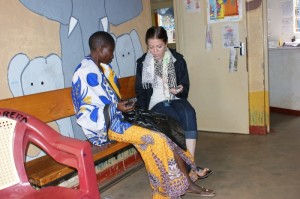Africa Calling, which started out as a class project at Camosun in January of 2011, has inspired a new social sciences class at the college while quickly growing into a not-for-profit organization aimed at delivering cell phones to rural villages.
“Our three main goals are all about saving lives,” explains Kevin Davis, a Camosun College student and one of the group’s founding members. “They are: helping people in rural villages in Africa, helping people in North America, and keeping phones out of the landfills.”
Now the college is offering a first-of-its-kind class at Camosun: Social Science 203: Service Learning and Global Issues, taught by sociology professor Francis Adu-Febiri. Adu-Febiri says the course is intended to be an interdisciplinary course: it’s not just for social science students, it’s for anyone interested in making a positive change in the world. The course will be credited at other postsecondary institutions.

“So far we have managed to get transfer credit for UVic, Simon Fraser University, and UBC Vancouver and UBC Okanagan,” says Adu-Febiri. “They will transfer as general social science credits.”
The new course will be available to take in January and will contain online and in-class components. Adu-Febiri says he’s also interested in developing the idea into a whole program.
“We have other courses that we are also trying to develop, such as Introduction to Africa, which will be an online course, and there will be another course on geography,” he says.
“The broader plan is to eventually have a diploma or an applied degree in global studies.”
Adu-Febiri also acknowledges that it’s important to keep the course open so its chances of being cancelled are lessened.
To get the project off the ground Adu-Febiri and Francis Yee, a fellow Camosun professor, received the $5,000 Camosun President’s Fund, allowing them to develop the concept of the course.
After the idea came to fruition Adu-Febiri and Yee were presented with $50,000 in BC Campus funding from the provincial government to further expand the course and have it accessible online.
While the aim of putting the course online is to have it accessible to everyone, some students are recognizing that the online component isn’t always a good fit.
“Online courses definitely work for some people, but I’m not sure that this idea where there are so many online courses and everyone just assumes that everyone will be okay with it is the right way to go,” says Matthew Helliwell, a first-year university transfer student.
Davis thinks what’s important is focusing on what the course is aiming to accomplish.
“What the course will focus on is picking an issue and a place, and work on solving it. It doesn’t need to be a huge thing,” says Davis. “Camosun is going to change the face of education. This is about interacting in the real world, not just learning about it.“
